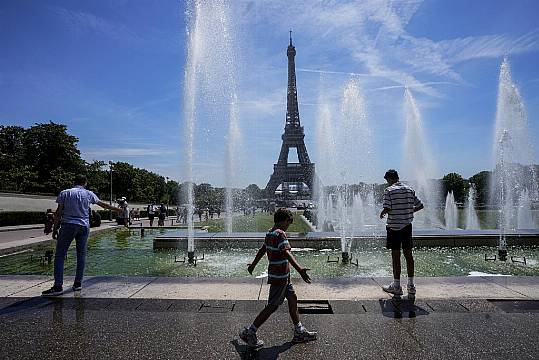A blanket of hot air stretching from the Mediterranean to the North Sea is bringing much of western Europe its first heatwave of the summer, with temperatures forecast to top 30C from London to Paris on Friday.
Experts said the unusually early heatwave is a sign of what is to come as global warming continues, moving up in the calendar the extreme temperatures that Europe would previously have seen in July and August.
“In some parts of Spain and France, temperatures are more than 10 degrees higher — that’s huge — than the average for this time of year,” said Clare Nullis, a spokesperson for the World Meteorological Organisation in Geneva.

In France, 18 million people woke to heatwave alerts affecting about a third of the country on Friday. Forest fire warnings were issued from the Pyrenees in the south to the Paris region.
Tourists dunked their feet in fountains near the Eiffel Tower and sought relief in the Mediterranean.
France has introduced numerous measures to cope with extreme summer temperatures after a deadly heatwave in 2003 killed about 15,000 people.
On Friday, schoolchildren were allowed to stay home in the 12 French regions in the south west and west that were under the highest alert. The government stepped up efforts to ensure nursing home residents and other vulnerable populations could stay hydrated.

Temperatures in France have mounted all week and passed 37C in the south west on Friday.
Night-time temperatures are also unusually high, and the heat is stretching to normally cooler regions in Brittany and Normandy on the Atlantic Coast.
Matthieu Sorel, a climatologist at national weather service Meteo France, told public broadcaster France-Info that temperatures are expected to break several records. He called the exceptionally early long stretch of hot weather a “marker of climate change”.
Britain’s Met Office said global warming has increased the average temperature of UK summers, and the likelihood of more extreme temperatures during hot spells and heatwaves.

Germany’s national weather service DWD predicted the big sweat would continue over the weekend, as the heat moves eastwards into central and eastern Europe.
The hot weather follows an unusually dry spring in western Europe, with authorities ordering water to be rationed in northern Italy and parts of France.
Experts say climate change is already affecting rainfall patterns and evaporation rates across the region, with knock-on effects for agriculture, industry and wildlife.
“Heat waves are starting earlier,” said Ms Nullis. “They’re becoming more frequent and more severe because of concentrations of greenhouse gases in the atmosphere, which are at record level.
“What we’re witnessing today is, unfortunately, a foretaste of the future.”

The current heatwave in Europe started almost a week ago in Spain, where temperatures reached up to 43C. Spanish authorities hope the weather will begin to cool again on Sunday.
The intense temperatures and a lack of rain has helped fuel wildfires across Spain, testing firefighting capacity.
Officials said on Friday that 9,000 hectares of wooded hill land in north-western Spain had been burnt by a wildfire that forced the evacuation of more than 650 people from eight villages.
The blaze in the Sierra de Culebra mountain range in the province of Zamora started on Wednesday during a dry electric storm.
Elsewhere in Spain, smaller wildfires are also raging in central Toledo province and in the north-eastern provinces of Zaragoza and Lleida.
Politicians and experts met on Friday in Madrid to discuss ways to tackle drought and the increasing spread of deserts across the globe.







